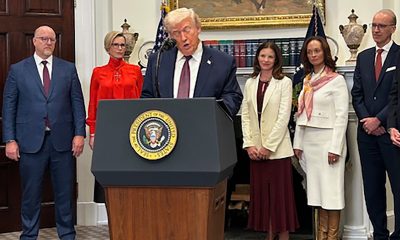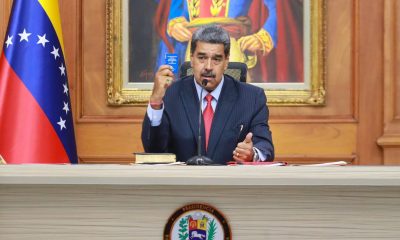Russia
‘Logistical error’ prevented Brittney Griner from speaking with wife on anniversary
Calls to embassy phone in Moscow went unanswered on Saturday
A State Department spokesperson on Tuesday admitted a “logistical error” prevented detained WNBA star Brittney Griner from speaking with her wife over the weekend.
Cherelle Griner told the Associated Press that her wife’s lawyers said she tried to call her 11 times “over a period of several hours” on Saturday, which was the couple’s fourth anniversary.
The AP reported the Russian government approved the call.
The U.S. Embassy in Moscow, according to the AP, had given Brittney Griner a number that was to have allowed her to connect to her wife in Phoenix once an embassy staffer received the call. The AP reported each of the calls that Brittney Griner made went unanswered because nobody was at the desk where the phone was located.
“I was distraught. I was hurt. I was done, fed up,” Cherelle Griner told the AP. “I’m pretty sure I texted BG’s agent and was like: ‘I don’t want to talk to anybody. It’s going to take me a minute to get my emotions together, and just tell everybody I’m unavailable right now.’ Because it just knocked me out. I wasn’t well, I’m still not well.”
Cherelle Griner said the call had been on her schedule for two weeks. She told the AP that she is “very pissed” about what happened.
“We deeply regret that Brittney Griner was unable to speak with her wife because of a logistical error,” the State Department spokesperson told the Washington Blade on Tuesday in a statement.
Officials at Moscow’s Sheremetyevo Airport in February detained Brittney Griner — a center for the Phoenix Mercury — after customs inspectors allegedly found hashish oil in her luggage. The State Department has determined that Russia “wrongfully detained” her.
“We cannot call her a hostage,” Kremlin spokesperson Dmitry Peskov told NBC News’ Keir Simmons on Monday. “She violated Russian law and now she is being prosecuted.”
Secretary of State Antony Blinken on May 14 spoke with Cherelle Griner.
Officials with the State Department’s Office of the Special Presidential Envoy for Hostage Affairs and Bureau of Educational and Cultural Affairs on June 13 met with Brittney Griner’s teammates to discuss her detention and efforts to secure her release. A Russian court the following day extended Brittney Griner’s detention through at least July 2.
“We are determined to bring her home along with Paul (Whelan, an American citizen who is serving a 16-year prison sentence in Russia after a court convicted him of spying) and for that matter, any and every American who is being unjustly detained anywhere in the world,” said Blinken on June 15 during a roundtable with this reporter and five other LGBTQ and intersex journalists. ” “It’s something that I am personally focused on, and I want to leave it at that because it is obviously an ongoing issue. But just know that this is a matter of intense focus for us.”
The State Department spokesperson reiterated this point.
“We have no higher priority than the safety and security of U.S. citizens overseas,” said the spokesperson. “We remain in regular contact with the families of those held hostage or wrongfully detained; we are grateful for their partnership and feedback; and we continue to work to ensure we are communicating and sharing information in a way useful to our families.”
Cherelle Griner told the AP that she no longer trusts the U.S. government.
“I find it unacceptable and I have zero trust in our government right now,” she said. “If I can’t trust you to catch a Saturday call outside of business hours, how can I trust you to actually be negotiating on my wife’s behalf to come home? Because that’s a much bigger ask than to catch a Saturday call.”
Russia
Gay Russian asylum seekers remain in ICE custody
Andrei Ushakov and Aleksandr Skitsan sought refuge in US in November 2024.
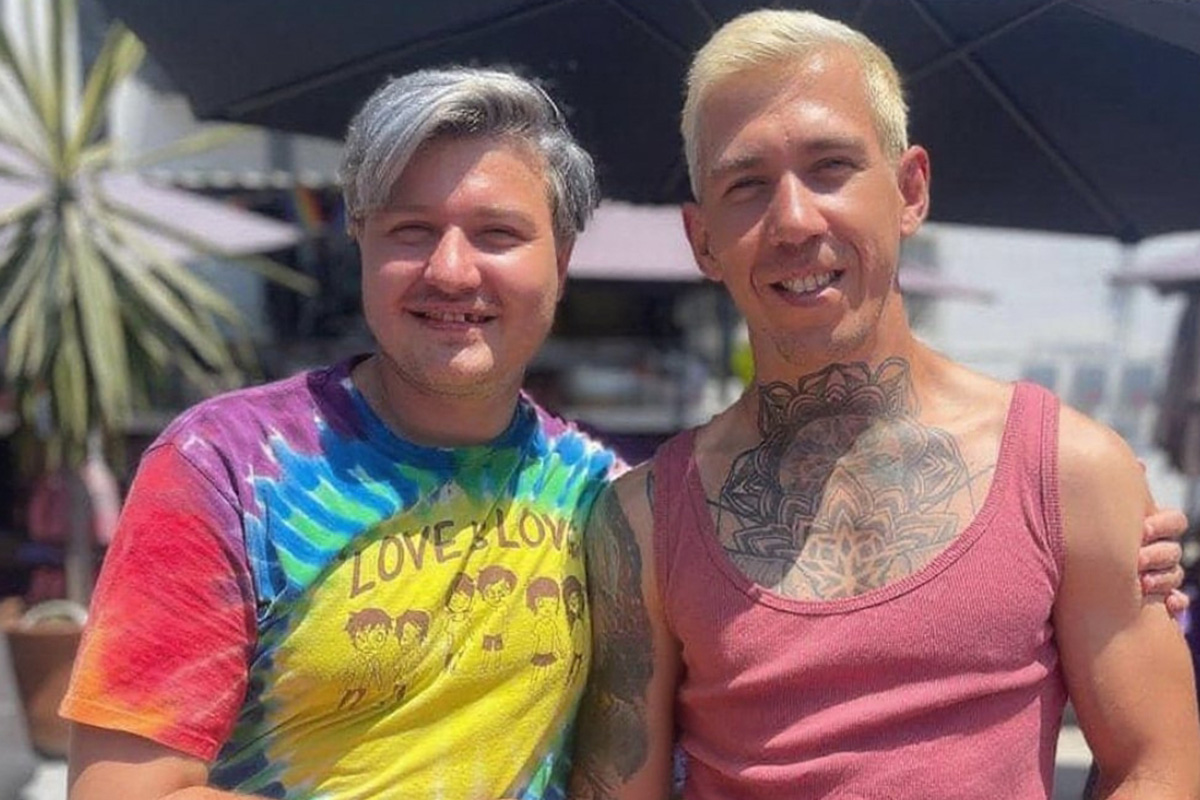
A gay married couple from Russia who has asked for asylum in the U.S. has been in U.S. Immigration and Customs Enforcement custody for nearly a year.
América Diversa, a group that advocates on behalf of LGBTQ immigrants, told the Washington Blade that Andrei Ushakov and Aleksandr Skitsan fled Russia on March 14, 2024, “after the government began labelling LGBTQIA+ organizations as ‘extremist.’” Skitsan “faced direct threats at his workplace, forcing them to flee for their safety.”
The State Department’s 2023 human rights report specifically notes a Russian authorities “used laws prohibiting the promotion of ‘non-traditional sexual relations’ to justify the arbitrary arrest of LGBTQI+ persons.” The 2023 report also cites reports that “state actors committed violence against LGBTQI+ individuals based on their sexual orientation or gender identity, particularly in Chechnya” and “government agents attacked, harassed, and threatened LGBTQI+ activists.”
Advocacy groups in August sharply criticized the State Department after it “erased” LGBTQ and intersex people from its 2024 human rights report. Immigration Equality and other organizations say this omission could jeopardize the cases of LGBTQ who are seeking asylum in the U.S.
Couple separated, not receiving proper medical care in ICE custody
América Diversa says Ushakov and Skitsan arrived in Mexico on March 15, 2024.
The men used the CBP (U.S. Customs and Border Protection) One app the Biden-Harris administration created that allowed them and other asylum seekers to schedule an appointment at a port of entry. Their appointment was on Nov. 27, 2024, and America Diversa said they asked for asylum on that day once they entered the U.S.
The Trump-Vance administration discontinued the CBP One app on Jan. 20, the day it took office.
“Upon entering U.S. custody, they (Ushakov and Skitsan) were separated without explanation,” said América Diversa.
Ushakov and Skitsan were initially detained at the Imperial Regional Detention Facility in Calexico, Calif., which is in the state’s Imperial Valley.
“Andrei was placed in an overcrowded unit with more than 60 detainees, where poor sanitation, excessive air conditioning, and the lack of adequate medical care have put his health at risk,” said América Diversa.
The group says the couple are now at the San Luis Regional Detention Center in San Luis, Ariz.
“They are now being denied all communication with each other, despite being legally married and sharing the same asylum case,” said América Diversa.
The group notes Ushakov has a “chronic medical condition that requires continuous medication and quarterly monitoring.”
“Despite repeated requests, he faces long delays in treatment and limited access to medical services,” said América Diversa.
América Diversa also noted Skitsan suffers from a “chronic ear infection, which causes ringing and temporary hearing loss, as well as untreated stomach issues.” América Diversa said Skitsan had been scheduled to see a doctor in December, but his “recent transfer to Arizona has jeopardized that case.”
“Their transfer to the San Luis Regional Detention Center has further worsened their situation,” said América Diversa. “At this new facility, they have been prohibited from communicating with each other, an act that violates not only basic humanitarian principles but also their rights as a legally married couple under both U.S. and international law.”
América Diversa Managing Director Yonatan Matheus on Oct. 22 told the Blade he had just spoken with Ushakov.
“He couldn’t talk with his husband, he was only able to talk with me for less than five minutes,” said Matheus. “The calls are recorded and monitored. He is very afraid to speak.”
The couple’s case are among those that have garnered attention since the Trump-Vance administration took office.
The White House earlier this year “forcibly disappeared” Andry Hernández Romero, a gay Venezuelan makeup artist who asked for asylum in the U.S., to El Salvador. He returned to his homeland in July after he spent more than 100 days in El Salvador’s Terrorism Confinement Center, a maximum-security prison known by the Spanish acronym CECOT.
ICE agents in August arrested Alice Correia Barbosa, a transgender Brazilian woman, while she was driving her car in Silver Spring, Md. A senior Department of Homeland Security official who misgendered Correia told the Blade that she “overstayed his visa by almost six years” and DHS plans to deport her.
Brazil has the highest number of reported murders of trans people in the world.
ICE did not respond to the Blade’s request for comment about Ushakov and Skitsan’s case.
Russia
Vladimir Putin takes office for fifth term as Russia’s president
Kremlin’s crackdown on LGBTQ people expected to continue
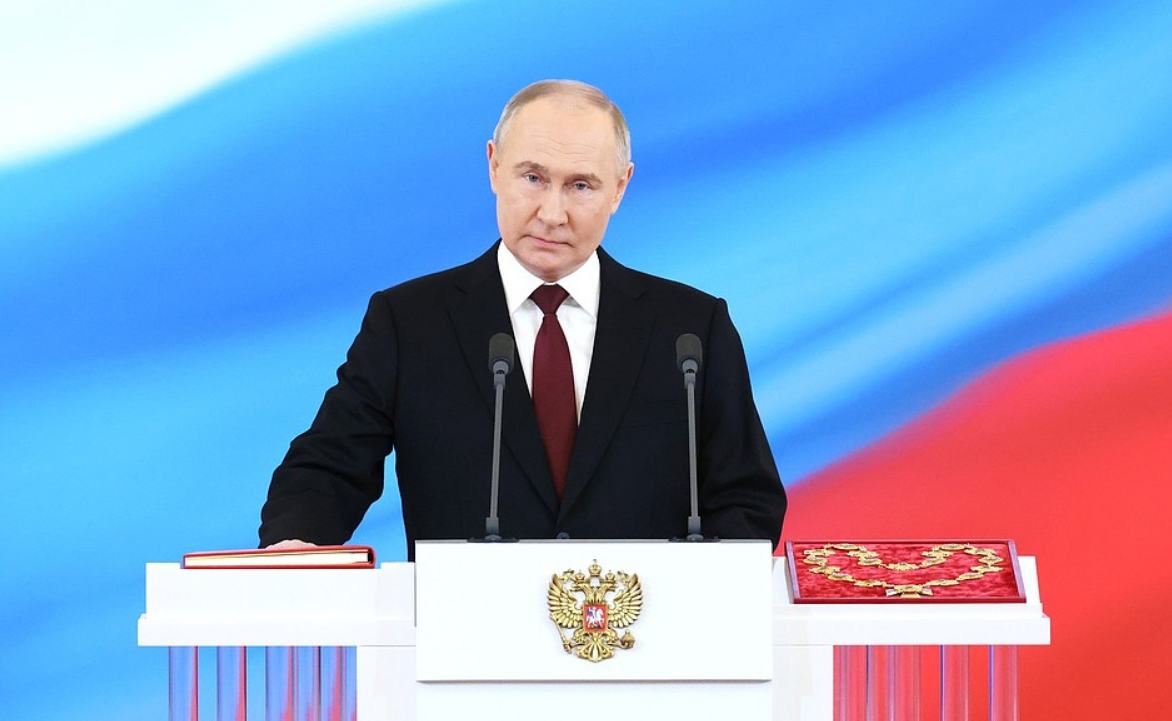
On Tuesday, Vladimir Putin took his oath of office becoming the second ever longest serving leader of the modern Russian state since Soviet dictator Joseph Stalin, who held power from 1922 until his death in 1953.
Putin’s tenure in office has been marked by his acquisition of concentrated political power in part due to his eradication and imprisonment or the deaths of his political opponents, such as his rumored unproven involvement in the assassination of fierce Putin critic Boris Nemtsov on Feb. 27, 2015, just steps away from the gate to the Kremlin, and more recently in the prosecution and imprisonment of another high profile Putin critic, Alexei Navalny, who died on Feb. 16 at a penal colony north of the Arctic Circle.
Putin ordered military operations in August 2008, which led to the Russo-Georgian War and diplomatic relations were broken. To this day, the two countries have maintained no formal diplomatic relations. Then in February and March 2014, Russian troops at his direction invaded the Crimean Peninsula, part of Ukraine, and annexed it. The resulting hostilities also spread to the far-eastern Ukrainian oblasts, [provinces] which culminated with Russia invading Ukraine on Feb. 24, 2022, an escalation of the Russo-Ukrainian War that started in 2014. The invasion became the largest attack on a European country since the end of World War II in 1945.
As the war drags on Putin’s threats of military escalation against NATO countries and use of battlefield nuclear weapons has created a tense relationship with a majority of the European Union as well as with the United States. Russia has been heavily sanctioned by the West and is turning to other totalitarian regimes like China, Iran, and North Korea for support.
In his inaugural speech Putin made oblique reference to his oft stated desire to recreate a hybrid of the former Soviet Union:
“In these solemn and crucial moments of assuming the office of the president, I would like to extend my heartfelt gratitude to the citizens of Russia across all regions of our country, as well as those living in the historical territories of Russia who have won their right to stand united with our Motherland.”
The Russian president then thanked the forces fighting in the invasion of Ukraine saying:
“I humbly honor our heroes, the participants in the special military operation, and all those who are fighting for our Fatherland. I would like to thank you again for the trust you have placed in me and for your unwavering support. These words are directed to every citizen of Russia.”
On the domestic front Putin has stifled media outlets with draconian laws passed designed to keep the Russian population largely ignorant of the cost both human lives and governmental spending as the warfare in Ukraine drags on and losses to the Russian military continue.
The Associated Press reported neither the U.S., U.K. nor German ambassadors attended. The U.S. Embassy said Amb. Lynne Tracy was out of the country on “prescheduled, personal travel.”
A handful of EU envoys attended even though top EU diplomat Josep Borrell said he told them “the right thing to do is not to attend this inauguration,” because Putin is the subject of an arrest warrant by the International Criminal Court for war crimes, accusing him of personal responsibility for the abductions of children from Ukraine.
In his speech Putin issued a veiled threat to critics of his regime that dissention would not be tolerated:
“We can see that the atmosphere in society has changed, and how much we now value reliability, responsibility, sincerity, integrity, generosity, and courage. I will do everything in my power to ensure that those who have displayed these admirable human and professional traits, and who have proved their loyalty to the fatherland through their deeds, achieve leading positions in state governance, the economy and all other spheres.
We must ensure reliable continuity in the development of our country for decades to come and bring up new generations who will strengthen Russia’s might and develop our state based on interethnic accord, the preservation of the traditions of all ethnic groups living in Russia, a civilizational nation united by the Russian language and our multi-ethnic culture.”
The Russian president has also targeted the country’s LGBTQ community with passage of multiple laws that forbid public mention or acknowledgment of queer Russians. In his speech he emphasized his commitment to maintaining “family values.”
“Our top priority is the preservation of the people. I am confident that the support of centuries-old family values and traditions will continue to unite public and religious associations, political parties, and all levels of government.
Our decisions regarding the development of the country and its regions must be effective and fair and must promote the prosperity of Russian families and improve their quality of life,” he said.
The Wilson Center, a nonpartisan think tank in D.C., noted recently:
“Escalating state discrimination against the LGBTQ+ community in Russia is directly informed by the Putin regime’s struggle to maintain legitimacy and public support, especially as Russia’s war in Ukraine drags on. Russian federal elections are scheduled for 2024, and officials are reportedly planning to project record levels of public support for Putin.”
The war in Ukraine and discrimination against the LGBTQ+ community are both popular policies among the socially conservative interest groups that make up Putin’s strongest base of support, and Russian policymakers draw clear connections between the Kremlin’s narrative that Russia is fighting Western ideology by proxy in Ukraine and the Kremlin’s attack on the LGBTQ+ experience in Russia.
Putin’s inaugural speech today signaled his future intentions on conducting the war in Ukraine and his ongoing persecution of LGBTQ+ Russians.”
Russia
Transgender journalist who enlisted in Ukrainian military designated a terrorist by Russia
Sarah Ashton-Cirillo is from the US
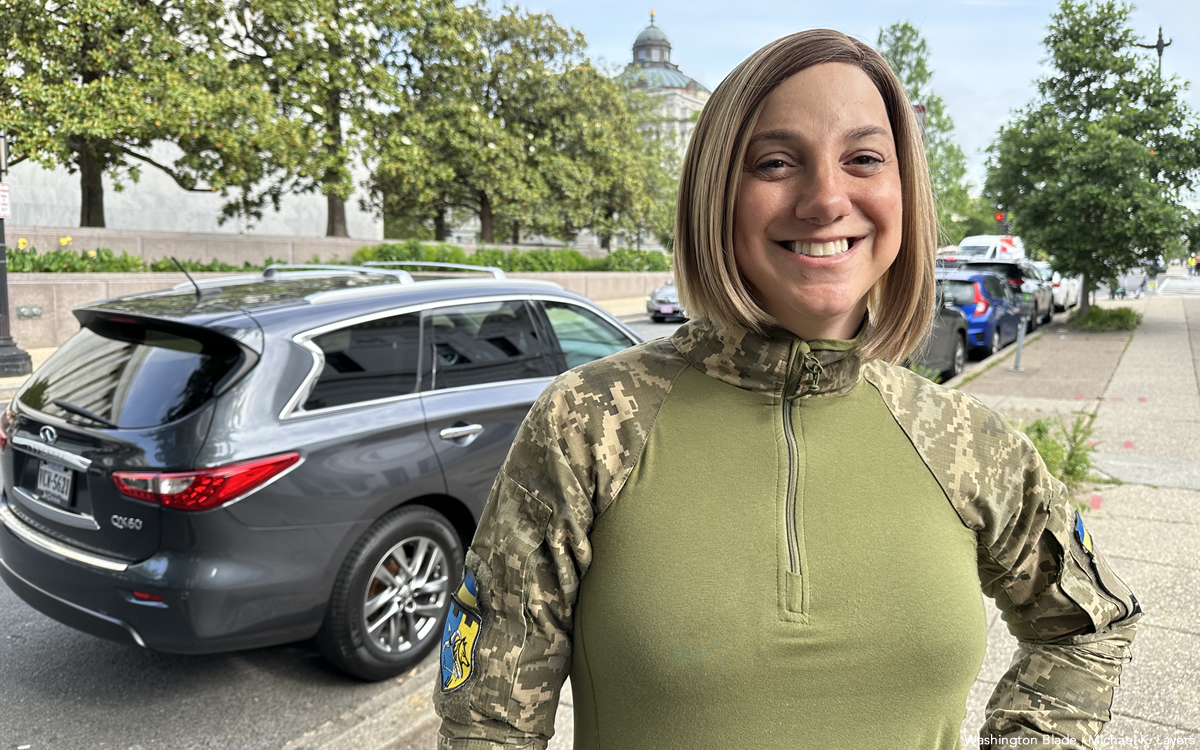
A transgender journalist from the U.S. who enlisted in the Ukrainian military has been designated a terrorist by Russia.
“The Kremlin added me to Russia’s official international terrorism list,” wrote Sarah Ashton-Cirillo in a Feb. 5 post on her X account.
Russia launched its war against Ukraine on Feb. 24, 2022.
Ashton-Cirillo was a journalist when she began to cover the Armed Forces of Ukraine’s Kharkiv Defense Forces. She later enlisted and is now a junior sergeant. Ashton-Cirillo has also traveled to the U.S. several times on behalf of the Ukrainian Defense Ministry.
Shrapnel from a Russian artillery shell wounded Ashton-Cirillo last February while she was working as a senior combat medic in a trench near Kreminna, a city in eastern Ukraine.
“For Russia to name me as an officially sanctioned terrorist is laughable enough, however what was truly indicative of the hate coming from the Kremlin’s regime was that every press release and article in Russia about my being placed on Putin’s terrorism list was prefaced with the fact that I am trans,” Ashton-Cirillo told the Washington Blade on Friday. “The Russian government is genocidal and hate ridden and this is why it will collapse.”

